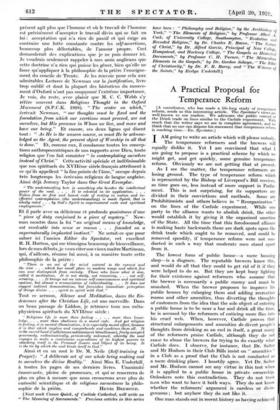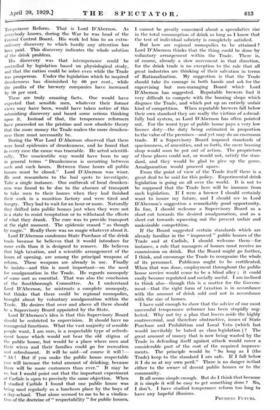A Practical Proposal for Temperance Reform
[A contributor, who has made a life-long study of temperance reform, sends us this interesting article. The Spectator's views am' well known to our readers. We advocate the public control of the Drink trade on lines similar to the Carlisle experiment. With much that the writer says we are in complete agreement, and we think that no one can dispute his statement that temperance reform is marking time.—En. Spectator.]
I AM going to write an article which will please nobody. The temperance reformers and the brewers will equally dislike it. Yet I am convinced that what I am going to propose is a practical scheme by which we might get, and get quickly, some genuine temperance reform. Obviously we are not getting that at present.
As I see the matter, the temperance reformers arc losing ground. The type of temperance reform which is represented by the Bishop of Liverpool's Bill receives, as time goes on, less instead of more support in Parlia- ment. This is not surprising, for its supporters are divided in their convictions and methods. Some are Prohibitionists and others believe in " Reorganization on the lines of the Carlisle experiment. While one party to the alliance wants to abolish drink, the other would establish it by giving it the organized sanction of the State. All the time that this foredoomed alliance is making haste backwards there are dark spots upon the drink trade which ought to be removed, and could be removed speedily, if temperance reform were not con- ducted in such a way that moderate men stand apart from it.
The lowest form of public house—a mere boozing shop—is a disgrace. The reputable brewers know this, and would do all that they could to get rid of it if they were helped to do so. But they are kept busy fighting for their existence against reformers who assume that the brewer is necessarily a public enemy and must be smashed. When the brewer proposes to improve his public houses by enlarging them and adding recreation rooms and other amenities, thus diverting the thoughts of customers from the idea that the sole object of entering a public house is to be near a bar and drink all the time, he is accused by the reformers of enticing more flies into his cruel web. When, however, Carlisle proves that structural enlargements and amenities do divert people's thoughts from drinking as an end in itself, a great many of the reformers praise Carlisle, although they do not cease to abuse the brewers for trying to do exactly what Carlisle does. I observe, for instance, that Dr. Salter and Mr Hudson in their Club Bills insist on " amenities in a Club as a proof that the Club is not conducted as a mere drinking place. I heartily agree. Yet Dr. Salter and Mr. Hudson cannot see any virtue in this test when it is applied to a public house in private ownership. Onlookers note this contradiction. They do not trust rhen who want to have it both ways. They do not know whether the reformers' argument is careless or disin- genuous ; but anyhow they do not like it.
One man stands out in recent history as having achieved Temperance Reform. That is Lord D'Abernon. As everybody -knows, during:the War he was head of the Central Control Board. His work led him to an extra- ordinary discovery to which hardly any attention has been paid. This discovery indicates the whole solution of the drink problem..
His discovery was that intemperance could be controlled by legislation based on physiological study, and that the nation could be sober even while the Trade was prosperous. Under the legislation which he inspired drunkenness has diminished by 60 per cent., while the profits of the brewery companies have increased by 90 per cent.
These are truly amazing facts. One would have expected that sensible men, whitever their former views may have been, would have taken notice of this astonishing discovery and based some serious thinking upon it. Instead of that, the temperance reformers have proceeded on the pristine and now obsolete theory that the more money the Trade makes the more drunken- ness there must necessarily be.
During the War Lord D'Abernon observed that there were local epidemics of drunkenness, and he found that in every case the cause was traceable. He acted scientifi- cally. The unscientific way would have been to say in general terms " Drunkermess is occurring between such and such hours. Between those hours all public houses must be closed." Lord D'Abernon was wiser. He sent researchers to the bad spots to investigate. Take a single instance. One outbreak of local drunken- ness was found to be due to the absence of transport to take men to their homes when they had finished their work in a munition factory and were tired and hungry. They-had to wait for an hour or more. Naturally they drifted into public houses just when they were not in a state to resist temptation or to withstand the effects of what they drank. The cure was to provide transport at the right moment. The epidemic ceased " as though by magic." Really there was no magic whatever about it.
Lord D'Abernon condemns State Purchase of the drink trade because he believes that it would introduce far more evils than it is designed to remove. He believes that high taxation, and a scientific arrangement of the hours of opening, are among the principal weapons of reform. These weapons are already in use. Finally he insists—and this is most important—on the need for amalgamation in the Trade. He regards monopoly of some sort as essential. That was also the conclusion of the Southborough Committee. As I understand Lord D'Abernon, he mistrusts a complete monopoly, but thinks that there could be regional monopolies, brought about by voluntary amalgamation within the Trade. He desires that over and above all there should be a Supervisory Board appointed by the State.
Lord D'Abernon's idea is that this Supervisory Board should be restricted to supervision. It should have no managerial functions. What the vast majority of sensible people want, I am sure, is a respectable type of refresh- ment house which would not bear the old stigma of the public house, but would be a place where men and their wives and their families could go for recreation and refreshment. It will be said—of course it will !- " Ah ! But if you make the public house respectable you will increase the total amount of drinking, because there will be more customers than ever." It may be so, but I would point out that the important experiment at Carlisle is open to precisely the same objection. When I studied Carlisle I found- that one public house was being used regularly as a luncheon place by the boys of a day-school. That alone seemed to me to be a vindica- tion of the doctrine of " respectability " for public houses. I cannot be greatly concerned about a speculative rise in the total consumption of drink so long as I know that the test of individual sobriety is completely satisfied.
But how are regional monopolies to be attained ? Lord D'Abernon thinks that the thing could be done by voluntary arrangement within the Trade. There is, of course, already a slow movement in that direction, for the drink trade is no exception to the rule that all great industries are thinking of their salvation in terms of Rationalization. My suggestion is that the Trade should take its courage in both hands and ask for the supervising but non-managing Board which Lord D'Abernon has suggested. Reputable brewers find it very difficult to compete with the boozing shops which disgrace the Trade, and which put up an entirely unfair kind of competition. When reputable brewers fall below their own standard they are really the victims of a dread- fully bad system, as Lord D'Abernon has often pointed out. For the worst type of public house pays a very low licence duty—the duty being estimated in proportion to the value of the premises—and yet may do an enormous trade. If a Supervisory Board imposed standards of spaciousness, of amenities, and so forth, the mere boozing shop would soon be put out of action. The proprietors of these places could not, or would not, satisfy the stan- dard, and they would be glad to give up the game. Amalgamation would proceed apace.
From the point of view of the Trade itself there is a great deal to be said for this policy. Experimental drink legislation is going on all over the world. It is not to be supposed that the Trade here will be immune from such legislation. If I were a brewer I should certainly want to insure my future, and I should see in Lord D'Abernon's suggestion a remarkably good opportunity. In fine, I should welcome a Supervisory Board as a short cut towards the desired amalgamation, and as a short cut towards squeezing out the present unfair and Undesirable competition.
If the Board suggested certain standards which are already familiar in the " improved " public houses of the Trade and at Carlisle, I should welcome them—for instance, a rule that managers of houses must receive no commission on drink. But the Board might go further, I think, and encourage the Trade to reorganize the whole of its personnel. Publicans ought to be certificated. When that was done, employment throughout the public house service would cease to be a blind alley ; it could easily become regulated and socially useful. I am inclined to think also—though this is a matter for the Govern- ment—that the right form of taxation is in accordance with the amount of drink sold and not in accordance with the size of houses.
I have said enough to show that the advice of our most successful temperance reformer has been stupidly neg- lected. Why not try a plan that leaves aside the highly controversial, and therefore obstructive, issues of State Purchase and Prohibition and Local Veto (which last would inevitably be hated as class legislation ) ? The great amount of money that is now being wasted by the Trade in defending itself against attack would cover a considerable part of the cost of the required improve- ments. The principle would be " So long as I (the Trade) keep to the standard I am safe. If I fall below it I do so at my own peril." There is no danger in that either to the owner of decent public houses or to the community. It all seems simple enough. But do I think that because it is simple it will be easy to get something done ? No, I don't. I have studied temperance reform too long to have any hopeful illusions.
PRUDENS FUTUR.I.

























































 Previous page
Previous page